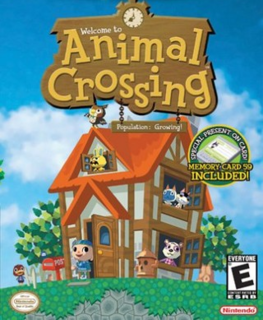Animal Crossing: A Game That Makes You A Better Person
Animal Crossing had some surprises in for me, however. It helped me redefine why I still play video games, no matter how often I feel like I've outgrown them. Even though I only occasionally revisit Tom Nook and the rest of the population of that fictional village I helped create three years ago, I'm always glad to see that they're still around, waiting for me to help them carry out their simple little errands. There's no great plot to the game, and some of the best features of the game, the little parallel community set up between myself and my girl, has been lost since I broke up with her. But the game works as much as a diary of my life and it's history, told in abstract, subtle ways, as it does as a piece of entertainment. And, three years later, I still dream about finding that last fossil to complete the Museum's collection, of catching a new fish, of contributing and helping those little, awkward-looking horses and mice my alter ego lives with.
Other games, most notably the Harvest Moon series, are also conceptually geared towards working, helping, belonging to a fictional community without any antagonists, without any ending or narrative thread. Animal Crossing remains, I think, the apogee of this sort of gaming experience, and although it took me a long time to pin down WHY I felt that way, I'm sure it is the enduring charm and general tone of the entire game. When interacting with the various denizens of your personal village, they speak in a sort of garbled, computerized approximation of English. Luckily, the game provides full text of their statements - almost like subtitles on a foreign film, they provide an opportunity to at least get an approximate feel, an empirical understanding, of the conversations. But like any translation, the meaning and tone can be accurate, but it can still lack an exact, unexplainable quality. That disconnect between the Appletalk vocals and the written text never ceases to fascinate me, because my avatar has grown from a naive, broke child scraping by for any money he could gather to perhaps the wealthiest man in the entire town -- despite the fact that he couldn't understand a damn word anyone said to him with certainty! I think about that during rough patches in my own life, and it cheers me up; at least I've never been shoved onto a train with no money or prospects and sent to a faraway place filled with insane raccoon shop-owners (a quick digression: I never understood how Tom Nook makes any money in the game, since it seemed like he would buy literally anything I offered to sell him. Pine cones, even! And I spent less money at his shop than he gave me for buying up all my useless items. Yet, somehow, he made a profit out of that system.). Not to mention my fictional neighbors, people who seemed incapable of walking two freaking blocks to drop off a radio, or a blanket, or some other consumer good they had previously borrowed from one of their friends.
The other innovation of Animal Crossing that I love is the way it forced me to be patient. Frequently, I'd run out of all possible scenarios until the next day rolled around, and I couldn't speed time up, I couldn't cut to the next opportunity for serious gameplaying action. Unlike Shenmue (another game I love, despite it's many flaws), though, time still continues even while the console is off, thanks to the magic of the Nintendo internal clock. After getting over the initial frustration, the sense that the game was in some ways dictating to me how I should play it, I realized what a wonderful little trick that was.
Anyway, in retrospect, I admire Animal Crossing more than I admire most other games. It goes on the shelf with other games that I feel compelled to play, no matter how many hours I've logged into them; games like Super Mario Bros. 3, Final Fantasy 7, Chrono Trigger, and most of the 2K series of sports games: those games have an emotional resonance, coupled with fun or innovative gameplay, that I rarely see. So thank you, my ex-girlfriend, for introducing me to one of the most wonderful games ever made.

